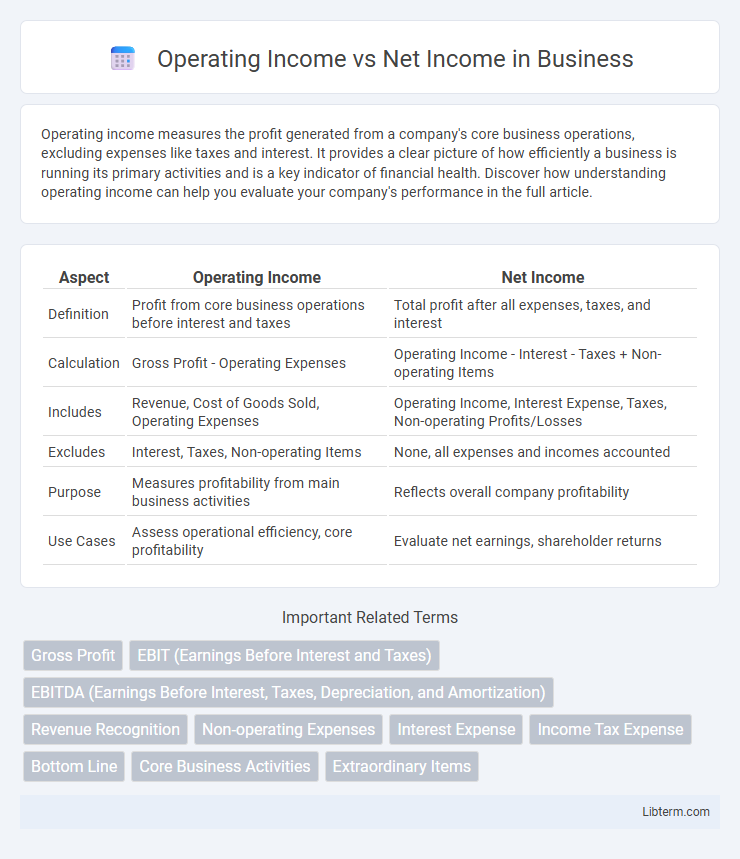Operating income measures the profit generated from a company's core business operations, excluding expenses like taxes and interest. It provides a clear picture of how efficiently a business is running its primary activities and is a key indicator of financial health. Discover how understanding operating income can help you evaluate your company's performance in the full article.
Table of Comparison
| Aspect | Operating Income | Net Income |
|---|---|---|
| Definition | Profit from core business operations before interest and taxes | Total profit after all expenses, taxes, and interest |
| Calculation | Gross Profit - Operating Expenses | Operating Income - Interest - Taxes + Non-operating Items |
| Includes | Revenue, Cost of Goods Sold, Operating Expenses | Operating Income, Interest Expense, Taxes, Non-operating Profits/Losses |
| Excludes | Interest, Taxes, Non-operating Items | None, all expenses and incomes accounted |
| Purpose | Measures profitability from main business activities | Reflects overall company profitability |
| Use Cases | Assess operational efficiency, core profitability | Evaluate net earnings, shareholder returns |
Introduction to Operating Income and Net Income
Operating income represents the profit generated from a company's core business operations, excluding expenses such as interest and taxes, providing insight into operational efficiency. Net income reflects the total profitability after deducting all expenses, including operating costs, interest, taxes, and non-operating items, offering a comprehensive view of financial performance. Both metrics are critical for assessing overall business health and guiding investment decisions.
Defining Operating Income
Operating income represents a company's profit generated from core business operations, calculated as gross profit minus operating expenses such as wages, depreciation, and cost of goods sold. Unlike net income, operating income excludes non-operating activities like taxes, interest, and one-time gains or losses, providing a clearer view of operational efficiency. It serves as a critical metric for assessing a company's ability to generate profit from its regular business before the impact of financing and tax strategies.
Defining Net Income
Net income represents the company's total profit after deducting all expenses, including operating costs, interest, taxes, and non-operating items, from total revenue. It reflects the bottom-line financial performance and is a critical metric for assessing overall profitability. Unlike operating income, which excludes non-operating expenses and revenues, net income provides a comprehensive view of the company's financial health.
Key Differences Between Operating Income and Net Income
Operating income reflects a company's profit from core business operations, excluding non-operating items like taxes and interest, while net income includes all revenues and expenses, providing the bottom-line profitability. Operating income is crucial for assessing operational efficiency, whereas net income offers a comprehensive view of overall financial performance. Understanding the distinction helps investors evaluate a company's fundamental business health versus total profitability.
How to Calculate Operating Income
Operating income is calculated by subtracting operating expenses, such as cost of goods sold (COGS) and selling, general, and administrative expenses (SG&A), from total revenue. It excludes non-operating expenses like interest and taxes, providing a clear view of a company's profitability from core business operations. The formula is: Operating Income = Revenue - Operating Expenses.
How to Calculate Net Income
Net income is calculated by subtracting all expenses, including operating costs, interest, taxes, and non-operating expenses, from total revenue. Operating income, also known as operating profit, is determined by deducting operating expenses from gross profit but excludes interest and tax expenses. To arrive at net income, begin with operating income and subtract interest expenses, taxes, and any other non-operating items.
Importance of Operating Income in Financial Analysis
Operating income represents the core profitability of a company's primary business activities, excluding non-operating income and expenses, making it critical for assessing operational efficiency. It provides investors and analysts with a clear view of how well a company's management is performing in terms of generating profit from its operations alone. Unlike net income, which includes taxes, interest, and one-time items, operating income offers a more consistent and reliable metric for evaluating ongoing financial health and operational performance.
Significance of Net Income for Investors
Net income represents a company's total profitability after deducting all expenses, taxes, and interest, making it a crucial indicator for investors assessing financial health and overall performance. Unlike operating income, which reflects earnings from core business operations only, net income provides a comprehensive picture of a company's ability to generate profit and sustain growth. Investors rely on net income to evaluate return on investment, dividend potential, and long-term viability.
Operating Income vs Net Income: Practical Examples
Operating income represents the profit generated from core business operations before interest and taxes, making it a key indicator of operational efficiency. Net income accounts for all expenses, including operating costs, interest, taxes, and non-operating items, reflecting the company's overall profitability. For example, a retail company might report an operating income of $500,000 from sales minus operating expenses, but after deducting interest payments and taxes, the net income could be $350,000, highlighting how financing and tax obligations impact the final profit figure.
Conclusion: Which Metric Matters Most?
Operating Income reveals a company's core profitability by excluding taxes and interest, making it essential for evaluating operational efficiency. Net Income provides a comprehensive bottom-line profit, accounting for all expenses, including taxes and interest, which is critical for understanding overall financial health. Investors and analysts often prioritize Operating Income to assess performance without external factors, but Net Income remains vital for gauging the true profitability available to shareholders.
Operating Income Infographic

 libterm.com
libterm.com